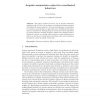33 search results - page 3 / 7 » Coordination through institutional roles in robot collective... |
ECAL
2007
Springer
14 years 4 months ago
2007
Springer
In a social scenario, establishing whether a collaboration is required to achieve a certain goal is a complex problem that requires decision making capabilities and coordination am...
TROB
2008
13 years 9 months ago
2008
Affordances encode relationships between actions, objects and effects. They play an important role on basic cognitive capabilities such as prediction and planning. We address the p...
SAC
1998
ACM
14 years 2 months ago
1998
ACM
This paper describes STL, a new coordination model and corresponding language. STL's power and expressiveness are shown through a preliminary distributed implementation of a ...
MIG
2010
Springer
13 years 8 months ago
2010
Springer
This paper explores the many uses of angular momentum regulation and its role in the synthesis of coordinated motion generated with physically based characters. Previous investigat...
ROBOCOMM
2007
IEEE
14 years 4 months ago
2007
IEEE
Abstract—Robust, dependable and concise coordination between members of a robot team is a critical ingredient of any such collective activity. Depending on the availability and t...

